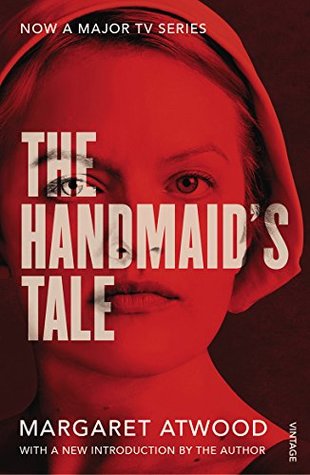Reviewed by Jo on
Originally published on Once Upon a Bookcase.
I've had The Handmaid's Tale by Margaret Atwood on my TBR for a while. I tried reading it a while back, but I wasn't in the right mood for it. But since watching the TV show, I was desperate to know where the story would go, so dug out my copy. And it was such a fascinating read.
The Handmaid's Tale is a really good story, and so thought provoking and really makes you angry. I was shocked and yet not shocked by what I read, and terrified that this story doesn't seem all that implausible, that it could happen fairly soon, with the way the world is going. However, I wasn't as wowed by it as I expected to be.
When Louise O'Neill's Only Ever Yours came out, it was always compared to The Handmaid's Tale, and I can see why, there is a level of similarity. But Only Ever Yours was the book that really opened my eyes, and shocked me to my core, so perhaps I read the two in the wrong order, and should have read The Handmaid's Tale first. Because it's just a lot quieter than a number of other books I've read.
Quiet isn't necessarily a bad thing. But it wasn't just that I wasn't in the right mood for the story the first time round, it was the voice - Offred's voice, and the style in which the story is told. If I hadn't already started watching The Handmaid's Tale TV show, I'm not sure I would have got all that far into a second attempt at reading the book. It was having watched and listened to Elisabeth Moss - who plays Offred in the show - that helped me with the book, because I could then hear her narrate, and I already kind of "knew" Offred. But most of the book is very much in Offred's head; it's what she thinks, what she remembers, her telling us about her life, and her thoughts often go off in various different directions; it all makes sense, but at first, it just seems odd and confusing.
There's also very little that actually happens in the book, which is kind of understandable, and Offred isn't allowed to do much, but it just felt really slow, this steady pace that doesn't go much of anywhere, not until the very end. Offred is mostly passive throughout; she might think about how wrong things are and how she doesn't want to do them, but she goes along with it all, because the consequences of not are unthinkable. But I'm so used to dystopian novels where people fight back, or try at least. And there is an underground movement trying to change things, but Offred isn't part of it.
Don't get me wrong, I still think the story is really good, and it has the desired affect, and it's one that will stay with me, but although it's still relevant, I feel it may be a little dated now? Just because dystopian novels published today tend to be much more active, and because of that, I was expecting more. It's still a book that has affected me, though. It's one I can't stop thinking about, but that might also be because of the TV show (which I find more engaging). Still, a really great book for making you think. Do give it a read.
Reading updates
- Started reading
- 5 July, 2017: Finished reading
- 5 July, 2017: Reviewed
